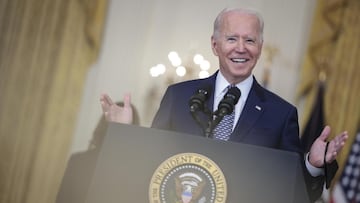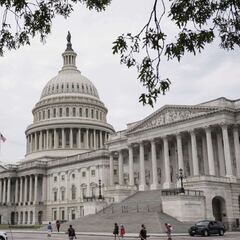$1 Trillion Infrastructure Bill breakdown: what's in the package?
The bipartisan bill aims to patch up the nation's damaged roads and transport links, but it has to navigate its way through the House of Representatives.


Needing at least 10 votes from the Republicans to pass the bill through the reconciliation process, the Democrats managed to convince 19 of the GOP to support them. This process should allow the Democrats to pass their larger $3.5 trillion budget plan later this month.
The Infrastructure bill is over 2,700 pages long and includes provisions for improving roads and general infrastructure across the country. Biden had made infrastructure one of his key legislative aims in his presidential campaign. However, only $550 billion of the plan is new investment, to be spent over the next five years.
What's in the bill?
The document provides a list of planned expenditure, including:
- $110 billion for roads and bridges
- $39 billion for public transport
- $66 billion for passenger and freight rail
- $7.5 billion for electric vehicle charging stations
- $5 billion for electric and hybrid school buses
- $42 billion to reduce congestion at ports and airports
- $55 billion for water and wastewater infrastructure
- $65 billion to expand broadband access
- $21 billion to clean up super sites and cap obsolete gas wells
- $73 billion to modernize the national grid and further introduce renewable energy
Related news
- Bipartisan infrastructure bill gains enough votes to pass in US Senate
- How many Americans will stop receiving the unemployment payment in September and why?
- Fourth stimulus check: will petitions have an effect on decision-making?
- July 2021 job report: How has the unemployment rate changed?
What have people said about the bill?
For those who supported the bill, it is being seen as a triumph of bipartisanship.
Secretary of Transportation Pete Buttigieg called the bill, "a big deal" for having both sides support. President Biden enthused about the bill in a speech, saying there were,"No Republican bridges or Democrat roads," before hailing that, "Democracy could still work," a reference to the negotiations across the aisle.
Republicans who supported the bill were less enthused, but admitted they needed to help their constituents. “This infrastructure bill is not the perfect bill,” said Senator Lisa Murkowski, one of the Republican negotiators. She said the senators kept at it, believing, “It’s better to get some of what our constituents want rather than none of it.”
But for the Republicans who didn't support the bill there is widespread anger at their colleagues. The GOP has been critical of the Democrats in recent weeks for the rising inflation in the US. however, the inflation can't be fully blamed on recent legislation but more so the country recovering from the economic fallout of covid-19. Regardless, many are seeing the infrastructure bill as contributing to that.
Texan Senator Ted Cruz was particularly scathing about the potential cost of both the infrastructure bill and the budget resolution.
Democrats are engaged in a $9.5 TRILLION spending spree. This week, they’re spending nearly $5 TRILLION.
— Ted Cruz (@tedcruz) August 10, 2021
$1,200,000,000,000 “infrastructure” bill
$3,500,000,000,000 Bernie budget resolution
Our country is facing an inflation bomb, due in part to the Democrats’ money printing.
And Floridan Senator Marco Rubio said Republicans who supported the bill, "shouldn't go around expressing outrage [at the budget resolution]," as they, "paved the way," by supporting the infrastructure bill.
What happens next?
Related stories
The bill will travel to the House of Representatives for further scrutiny. However, Nancy Pelosi, Speaker of the House of Representatives, says she will not push the infrastructure bill forward until she receives the $3.5 trillion Budget Plan bill. This bill is targeted to addressing education, healthcare and other social spending, but may include tax rises on the most wealthy to pay for it.
The Republican Party roundly opposes the budget plan, so there are still months of discussions and arguments before either of these bills are fully ratified. The budget resolution must be passed before Congress can pass final legislation. It is hoped that the House of Representatives will begin their deliberating by late September after the summer recess.

